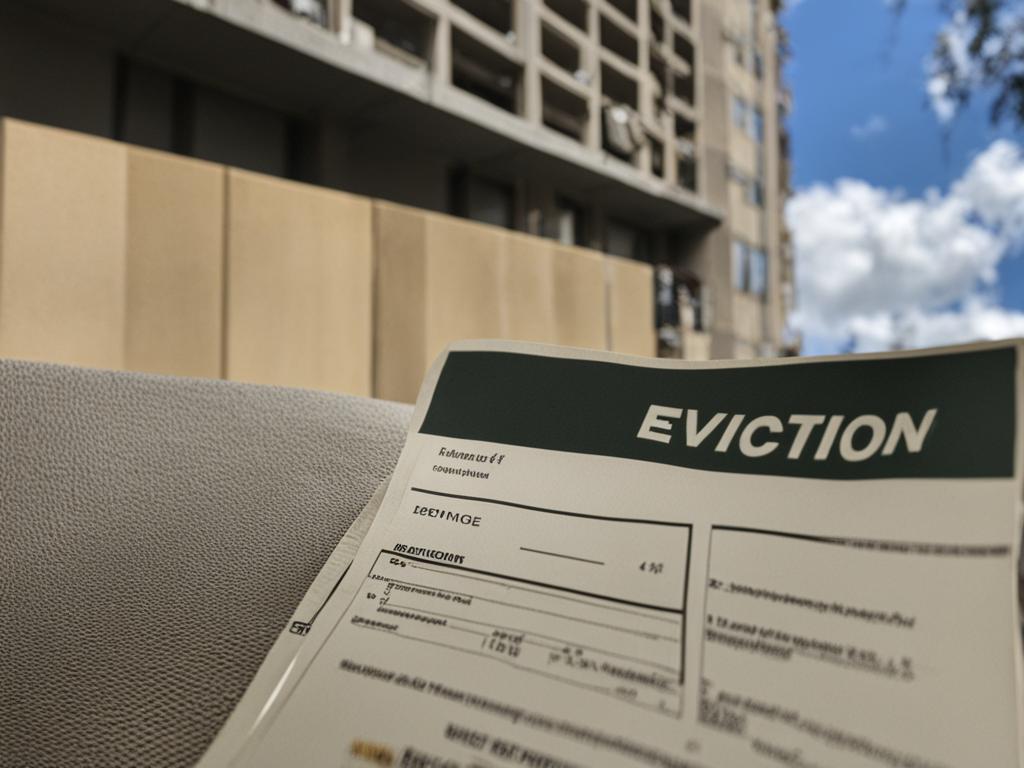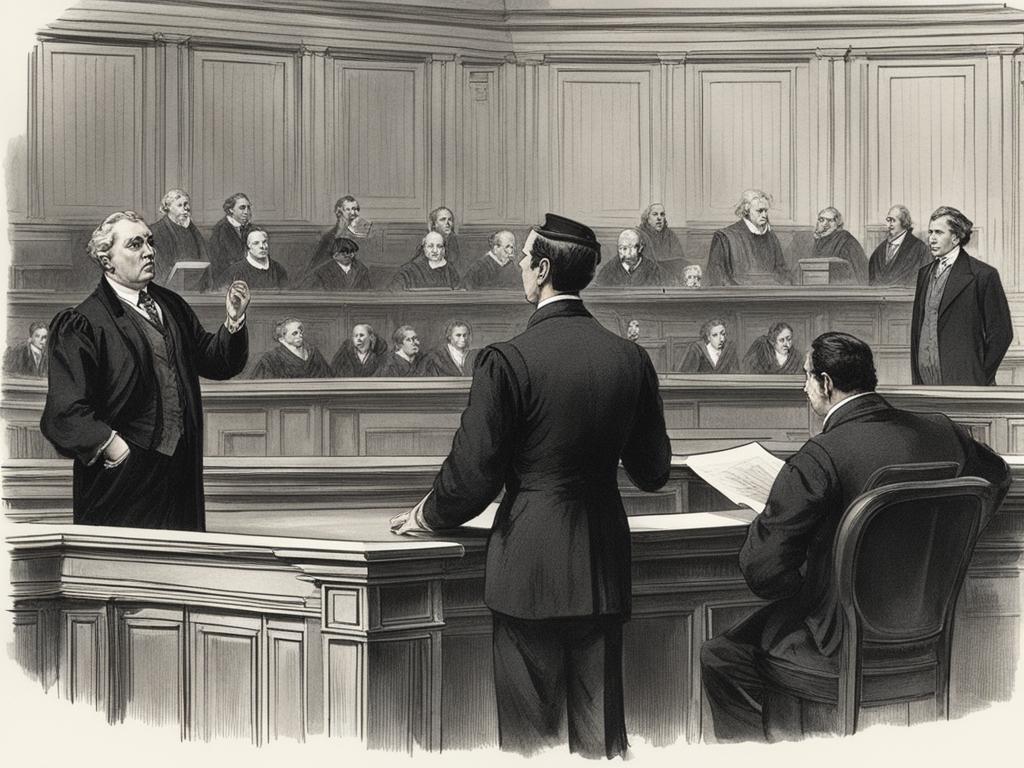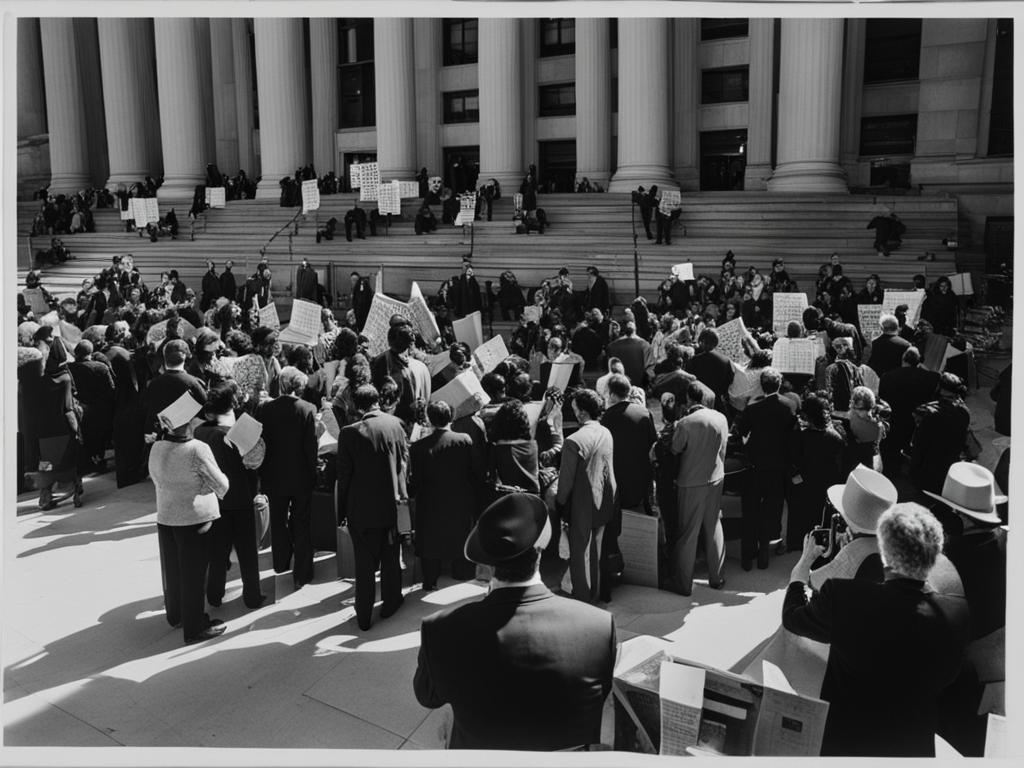Evicted Tenant Rights: Can They Return to Property?
Navigating the nuances of the tenant eviction process is fundamental for both landlords and tenants. The protections and obligations that constitute evicted tenant rights often prompt the question, “Can an evicted tenant return to property”? This pivotal issue is deeply entrenched in the fabric of eviction laws and rattles the principles of the legal process for eviction. Whether an individual is in the throes of eviction or trying to grasp the potential for reclaiming rental property, understanding the overlay of legal stipulations is paramount.
Key Takeaways
- Tenants have specific rights that must be upheld throughout the eviction process.
- The ability to return to the property after eviction hinges on the legal outcome of the eviction proceedings.
- Understanding the proper procedures and eviction laws is crucial when facing eviction.
- Tenants must be aware of the timelines and defenses available within the legal process for eviction.
- The right to reclaim personal property is an integral aspect of evicted tenant rights.
Understanding the Legal Basis for Eviction
When landlord-tenant disputes escalate to the point of eviction, understanding the fundamental legal processes and the eviction laws is crucial. The formal procedure is strictly regulated by law to ensure the rights of both parties are maintained.
The Eviction Notice: A Critical First Step
Before a landlord can initiate eviction proceedings, they must first provide an eviction notice to the tenant. This document serves as the official signal that the landlord wishes to reclaim the rental property for reasons stated therein. The notice outlines the duration within which the tenant is expected to respond or vacate the premises.
Grounds for Eviction: Payments, Lease Terms, and Behavior
Diverse situations may lead to the issuance of an eviction notice. Among the common grounds for eviction are non-payment of rent, breach of lease agreements, and disruptive behavior. Such grounds form the legal basis that allows landlords to start the tenant eviction process but must be thoroughly documented to be upheld in court.
Eviction Proceedings: The Role of the Court
The courts have a pivotal role in the legal process for eviction, ensuring that every step is taken in accordance with state and federal eviction laws. From reviewing the notice to mediating in landlord-tenant disputes, the legal system provides the structured environment for fair and lawful eviction practices. During these hearings, tenants have the opportunity to present their defense, potentially altering the course of the eviction proceedings.
Can an Evicted Tenant Return to Property?
When it comes to the question, “Can an evicted tenant return to property?”, eviction laws provide a clear framework for understanding evicted tenant rights and reclaiming rental property. The short answer is that typically, once a tenant is lawfully evicted, they cannot return to live in the property without the landlord’s consent. Evictions are a legal measure landlords take to remove tenants from their property, usually due to lease violations, nonpayment of rent, or other breaches of the rental agreement.

However, the path to eviction is not always straightforward, and certain outcomes can affect a former tenant’s ability to return to the property. If a tenant manages to remedy the issue that led to their eviction, such as paying back all owed rent and any court costs or legal fees, before an eviction has been fully processed, they might be able to avoid eviction entirely. The specific circumstances will vary by state, as each state has its own set of rules governing landlord-tenant relations.
- Post-Eviction Proceedings: In the event the court finds in favor of the landlord, the evicted tenant generally loses the legal right to occupy the property.
- Settlements Outside of Court: Sometimes an agreement is reached outside of court, giving the tenant a second chance under strict conditions.
- Payment of Debt: Eviction laws may allow for tenants to remain in the property if they can promptly fulfill financial obligations.
Most states require a court order to remove tenants from a rental property, and eviction is a last resort following a specified legal process. – American Housing Law
Evicted individuals seeking to understand their specific rights should consider legal counsel to navigate the complexities of eviction proceedings. Whether contesting an eviction, negotiating with landlords, or considering re-entry post-eviction, understanding one’s legal standing is paramount in exercising and protecting tenant rights.
Tenant Rights During the Eviction Notice Period
Understanding tenant rights during the eviction process is critical for individuals who have received an eviction notice. Not only is the legal process for eviction intricate, but there are also stringent eviction laws that must be followed by landlords to ensure the process is fair and just. Awareness of these rights can provide tenants with the knowledge needed to contest an eviction if necessary.
Scrutinizing the Notice to Quit
The receipt of a notice to quit marks the beginning of a potential eviction process, serving as a clear indicator that tenants need to either remedy the situation or prepare to vacate the premises. However, tenants are entitled to a notice that fits within the confinement of state and local laws.
- Full disclosure of the reason for eviction
- Landlord and tenant names accurately recorded
- Correct address of the rental property
- Adequate notice period before the eviction date
Addressing a Landlord’s Failure to Provide Proper Notice
Should a landlord not adhere to the established protocols in delivering an eviction notice, tenants may have legal grounds to contest the eviction. A proper notice must follow state-specific guidelines, ensuring the tenant’s right to prepare for or oppose the eviction is respected.
If an eviction notice does not meet legal requirements, a judge can postpone the eviction until the landlord rectifies the notice, affirming the rights granted to tenants under the law.
| Requirement | Correct Notice | Deficient Notice |
|---|---|---|
| Eviction Reason Stated | Clearly stated (e.g., Late rent) | Vague or not included |
| Notice Period Length | According to state laws (e.g., 30 days for non-payment) | Insufficient time provided |
| Identifying Information | Fully documented names and address | Incorrect or missing details |
| Delivery Method | Provided in a manner legally recognized in the state (e.g., in person) | Delivered in a way not permissible by the law |
For tenants navigating through the complexities of an eviction notice period, it is paramount that they understand the protections offered to them under eviction laws. These rights are designed to prevent abrupt and unfair displacement from their homes, allowing a reasonable timeframe to respond to the allegations or seek legal counsel.
Representation and Defense at the Eviction Hearing
The tenant eviction process reaches a critical juncture during the eviction hearing. It is a pivotal event where tenant rights are actively defended and the legal process for eviction continues to unfold. Tenants must understand the importance of representation and the defense mechanisms available to them to prevent an unfavorable default judgment.

Having legal representation, whether through an attorney or a knowledgeable advocate, can significantly influence the hearing’s outcome. Those who come prepared, understanding their rights fully, can present a counterclaim or articulate a robust defense against the eviction. To underscore the importance of preparation, here is a guide for tenants:
| Action | Purpose | Impact on Tenant Rights |
|---|---|---|
| Secure Legal Representation | To navigate the complexities of eviction laws and present a substantive defense | Enhances the likelihood of a favorable outcome for the tenant |
| Attend All Scheduled Hearings | To ensure active participation and voice any objections or defenses | Prevents default judgments and demonstrates tenant accountability |
| Request Continuation if Necessary | To gain additional time for case preparation or to secure representation | Allows for a comprehensive defense and avoids hasty decisions |
| Verify Hearing Status | To avoid missing critical updates or changes to the hearing schedule | Ensures tenant’s presence and ability to take part in the hearing process |
Asserting one’s tenant rights during an eviction hearing is not merely about showing up; it is about being strategically prepared. Your rights are the bedrock of your defense and must be effectively leveraged to influence the decision of the court.
In essence, the tenants’ preparedness for the eviction hearing can be as consequential as the facts of the case itself. Therefore, understanding and exercising these rights within the legal process for eviction is essential to maintaining one’s housing and livelihood.
Navigating the Post-Hearing Judgment
After the conclusion of an eviction hearing, tenants are met with the crucial task of understanding the post-hearing judgment rendered by the Magisterial District Judge. The implications of this judgment are significant and can determine whether a tenant will face eviction or be allowed to stay in the property. It is essential to comprehend the differences between the types of judgments that can be issued, as well as the action steps needed in the aftermath.
Understanding Different Types of Judgments
Judgments in eviction cases can come in several forms, each with specific consequences for the tenant. A clear grasp on these outcomes can empower tenants to respond appropriately and, when possible, retain their residence or minimize additional financial burdens.
Possession Granted Versus Money Judgments Explained
In the tenant eviction process, a judge may issue a possession granted decision, effectively signaling the end of the tenant’s right to occupy the property. Conversely, a money judgment requires the tenant to pay the due amount. Occasionally, they are combined: a tenant may avoid eviction by satisfying the money judgment within a given timeframe.
| Type of Judgment | Description | Tenant Action |
|---|---|---|
| Money Judgment | Financial amount owed by tenant to landlord | Pay in full or agree on a payment plan to avoid further legal action |
| Possession Granted | Court orders the tenant to vacate the premises | Prepare to leave; consider eviction appeal process if applicable |
| Possession Granted if Money Judgment Not Satisfied | Tenant must pay the owed amount by a specified date to remain | Settle debt by the deadline to prevent eviction |
Understanding these judgments is integral to navigating the path forward after an eviction judgment. Tenants may have the option to satisfy the financial obligations to maintain possession or, if faced with an unfavorable judgment, proceed with the eviction appeal process. Knowledge of these facets is a crucial part of the post-hearing journey for tenants.
Eviction Appeal Process: Challenging the Court’s Decision
When tenants find themselves at odds with an eviction judgment, understanding the eviction appeal process is vital. According to eviction laws, tenants have a window—commonly 10 days—to file an appeal, asserting their tenant rights to a fair legal process. This appeal is not merely a formality; it represents a critical juncture where the outcome of a legal proceeding can take a new direction, impacting whether an evicted tenant can return to the property or not.
At the heart of this process is the tenant’s ability to question the legality of the legal process for eviction, which initially led to their situation. The appeal must be filed with the Court of Common Pleas, and in some cases, may require the tenant to post a bond. While an appeal is pending, the original eviction process enters a state of hiatus, offering breathing space for both legal reflection and potential rectification of issues that might have led to the initial eviction judgment.
| Step in Eviction Appeal Process | Details and Requirements |
|---|---|
| Filing the Appeal | Within the set deadline, often 10 days from judgment |
| Posting Bond | May be required to pause the eviction process |
| Court of Common Pleas | Where the appeal is filed and heard |
| Outcome of Appeal | Potential reversal of eviction allows tenant to possibly return to property |
An appeal does not guarantee a change in outcome, but it does ensure that the eviction appeal process faithfully honors the legal rights afforded to tenants. Should new evidence arise or if procedural flaws are identified, this pivotal step might just empower an evicted tenant to overturn the court’s decision and secure the right to reoccupy their residence.

It is imperative that tenants execute their appeal with diligence and clarity. Lack of knowledge regarding their rights or missteps in the appeal process can lead to unfavorable and permanent outcomes. Tenants are advised to seek legal counsel to navigate this process correctly and stand a fighting chance in the face of eviction.
Consequences of a Completed Eviction
When the dust settles on eviction proceedings, the consequences of a completed eviction become very real for those involved. Understanding the far-reaching implications is vital for both tenants and landlords as they navigate the aftermath of an eviction order.
The Finality of an Eviction Order
The issuance of an eviction order carries with it the finality that concludes the tenant’s occupancy rights. The eviction process, mandated by law to be fair and structured, ends with a legal directive that obliges the tenant to vacate the premises by a date set by the court. If this date lapses and the tenant remains, repercussions ensue.
Forcible Removal and Changing Locks: The Last Resort
In instances where tenants do not comply with the eviction order, landlords are compelled to employ the last resort measures. Such measures include forcible removal, an action usually carried out by legal officials such as constables or sheriffs. Following such an intervention, landlords resort to changing locks to prevent any re-entry, marking a definitive end to the tenancy. These steps, while harsh, denote the seriousness of completed eviction consequences.

| Action | Entity Responsible | Consequence for Tenant |
|---|---|---|
| Eviction Order Issued | Court System | Mandatory Vacate Directive |
| Non-Compliance by Tenant | Tenant | Potential Forcible Removal |
| Forcible Removal | Constable/Sheriff | Physical Eviction from Property |
| Locks Changed | Landlord | Denied Property Access |
The end stage of eviction proceedings is not to be taken lightly; the repercussive nature of eviction order finality underscores the urgent need for tenants to comply with court orders and for landlords to follow legal protocols to the letter.
Reclaiming Property After an Eviction: Rights and Procedures
Understanding the intricacies of reclaiming property after eviction is critical for tenants who have gone through the unsettling process of being removed from their dwelling. The balance between tenant rights and landlord obligations is strictly regulated by eviction laws, ensuring that both parties act within their legal remits during and after the eviction.

Once an eviction has been lawfully executed, tenants may still need to recover personal items left behind. According to state regulations, landlords are usually required to care for their former tenant’s belongings for a certain period. Here’s a table illustrating the steps a tenant should follow to retrieve their possessions without violating any retrieval laws:
| Steps for Property Reclamation | Timeframe | Additional Notes |
|---|---|---|
| Contact your landlord to arrange a property retrieval time. | Within 24-48 hours post-eviction | Quick response can prevent miscommunication or disposal of items. |
| Identify essential items. | Immediately | Essential items include legal documents, medications, and necessary personal effects. |
| Notify the landlord in writing of the intention to retrieve belongings. | No specific timeframe, but as soon as possible | Writing provides a record of communication. |
| Understand the state’s eviction law regarding property retrieval. | Before contacting the landlord | Laws vary by state; knowledge is critical. |
| If necessary, seek court intervention. | If the landlord denies access without cause | Ensure to act within state deadlines for property reclamation. |
Remember, it’s crucial to act expediently and be aware of the timeline set forth by state laws for reclaiming possessions. A delay on the tenant’s part can result in forfeiting their rights to the belongings.
Landlords are typically forbidden from summarily disposing of a tenant’s belongings immediately after an eviction. This protective measure gives tenants a cushion to coordinate the recovery of their items. However, tenants should not assume indefinite storage and must take responsibility for timely retrieval. Those who believe their rights are being infringed upon may want to explore legal recourse to ensure compliance with eviction laws and protection of their property.
Tenant’s Responsibility for Personal Belongings Post-Eviction
Eviction proceedings mark a stressful period for tenants, especially when concerns arise regarding personal belongings. The obligations a tenant faces do not end with vacating the property; what happens to their items left behind is also governed by specific legal stipulations. Tenants must be aware of their individual responsibilities and the legal measures at their disposal for handling personal effects post-eviction.
Landlord’s Obligation to Store Abandoned Property
After an eviction, landlords are not free to immediately dispose of any belongings tenants leave behind. They are legally required to store abandoned property for a state-mandated duration, typically extending up to thirty days. This provides tenants with a reasonable timeframe to reclaim their possessions. However, for belongings deemed essential, like identification documents or medical equipment, the window for recovery may be as short as five days. Landlords must provide clear notice to former tenants about these timelines and the process for retrieving their items.
Legal Remedies for Retrieving Personal Property
If a landlord fails to comply with their responsibilities, or if any disputes occur regarding the property left behind, tenants have legal avenues available to them. Filing a motion, a tenant can challenge any imposed liens on their personal belongings or contest unfair practices. The court can then order the return of items or provide other appropriate legal remedies to ensure the law is upheld and tenants can retrieve their rightful property. Understanding these rights is crucial in preventing loss of property or additional distress following an eviction.

Conclusion
In the broad spectrum of landlord-tenant disputes, eviction signifies a critical event with profound repercussions. Tenants embroiled in eviction proceedings must acutely understand the protections afforded to them under the law. From asserting tenant rights to meticulously following the legal process for eviction, the proficiency with which tenants manage these situations can make a significant difference in the outcome.
Whether it is the initial reception of an eviction notice or the complexities of reclaiming rental property and personal belongings, the weight of knowledge cannot be overstated. Familiarity with the law informs tenants on how to handle each step—from eviction notices to courtroom defenses, appeals, and ultimately, the retrieval of possessions. It also illuminates the path to rightful actions and remedies post-eviction.
Indeed, understanding your rights does not simply prepare you for the potential fallout of an eviction; it equips you with the tools necessary to confront the challenge head-on. This could mean vacating the premises with dignity, reclaiming that which is lawfully yours, or in some cases, avoiding eviction altogether. In this complicated dance of legalities, knowledge is the power that tenants can leverage to maintain their standing and secure their future housing stability.
FAQ
What are the evicted tenant rights when it comes to re-entering the property?
An evicted tenant cannot re-enter or reclaim the rental property after a lawful eviction, as per eviction laws. The right to return might only be possible if specific conditions of the eviction are met, such as payment of arrears within a specified period, or if the tenant successfully appeals the eviction.
What is the tenant eviction process and how does it start?
The tenant eviction process starts with an eviction notice, which must be lawfully served and provide sufficient notice. This may vary depending on the reason for eviction such as non-payment of rent, lease terms violations, or other substantial breaches of the lease agreement.
What are the legal grounds for issuing an eviction notice?
Grounds for eviction may include persistent late rent payments, breach of lease terms, significant damage to property, or unlawful activity on the premises. A legal process for eviction involves serving a notice to quit followed by court proceedings if necessary.
Can a landlord evict a tenant without going to court?
No. Landlords must follow legal processes for eviction, which generally include going to court to obtain an eviction order. Attempting to remove tenants without a court order is illegal and can be considered a “self-help” eviction.
What should a tenant do if they receive an eviction notice?
Upon receiving an eviction notice, a tenant should review it for accuracy, consult the lease agreement, and seek legal advice if necessary. They should also prepare to either rectify the violation that led to the notice or gather evidence and arguments to defend against the eviction in court.
Can a tenant contest an eviction notice?
Yes, a tenant can contest an eviction notice if they believe it is based on incorrect information, improper grounds, or if the landlord failed to provide proper notice as required by eviction laws.
What happens during an eviction hearing?
At an eviction hearing, the court will listen to both the landlord and tenant present their cases. The tenant has the opportunity to present a defense and may be represented by an attorney. The judge will make a decision based on evidence and arguments presented.
How does a tenant appeal an eviction judgment?
To appeal an eviction judgment, a tenant must file a notice of appeal with the appellate court within a certain number of days after the judgment (often 10 days). They may need to post a bond and the appeal will halt the eviction process until resolved.
What are a tenant’s rights regarding their possessions after an eviction?
After an eviction, a tenant has the right to retrieve their personal belongings. The landlord is typically required by law to store these items for a specified period and provide the tenant with reasonable opportunities for retrieval.
What responsibilities does a landlord have concerning a tenant’s abandoned property post-eviction?
A landlord has the responsibility to store the tenant’s abandoned property for a legally mandated period, which is often 30 days. They must allow the tenant to claim the property within this period, while essential items typically have a shorter window for retrieval.
What should a tenant do if they are facing difficulties reclaiming their property after an eviction?
If a tenant faces difficulties in reclaiming their property post-eviction, they should first try to negotiate with the landlord. If that fails, they may need to take legal action to claim their belongings by filing a motion or seeking court intervention.
How can an eviction affect a tenant’s future ability to rent?
An eviction can significantly affect a tenant’s ability to rent in the future, as it may show up on rental history reports and credit checks. Landlords often consider past evictions when deciding whether to rent to a prospective tenant.

